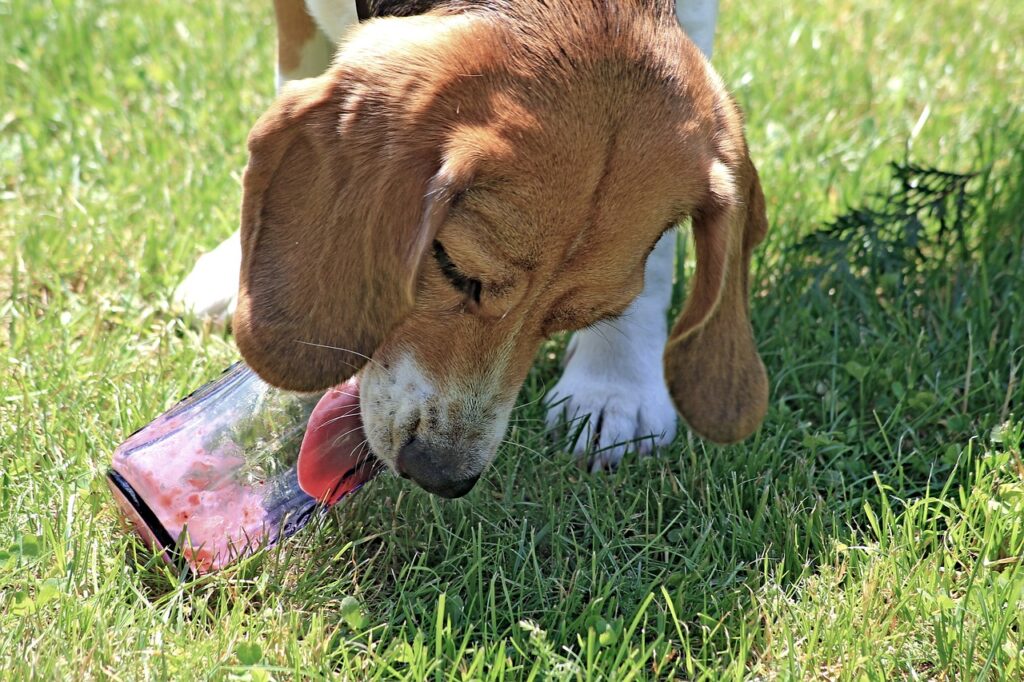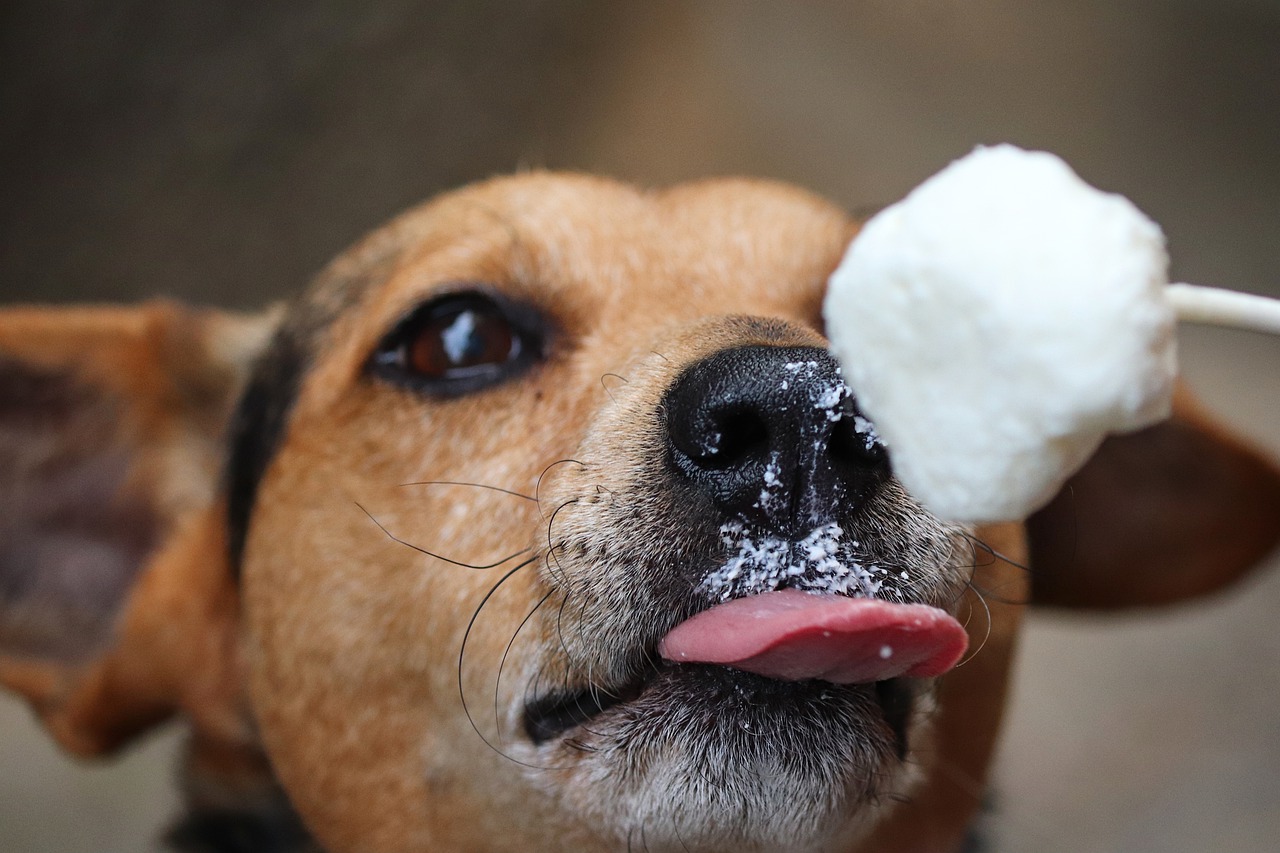SUMMARY
- Dogs that are not lactose intolerant can eat sour cream without any problem. Sour cream isn’t overtly toxic to dogs and won’t cause significant issues in most healthy dogs.
- However, there are potential risks that you should be aware of, including:
a) Excess calories: Can lead to unhealthy weight gain and even shorten the lifespan of your dog.
b) High-fat content: Causes a wide range of health conditions, including weight gain, heart disease, and pancreatitis (or inflammation of the pancreas) among others.
c) Lactose content: Can wreak havoc on dogs with lactose intolerance, causing diarrhea, vomiting, and other symptoms (like weakness, abdominal pain, excessive thirst, bloating, dehydration, and weight loss).
d) Additives: Are neither recommended for dogs nor offer any significant nutritional benefits
- Moderation is key. Feeding your dog small amounts of sour cream shouldn’t cause any substantive health problems.
- If you must share sour cream with your dog, do it sparingly and certainly not as a regular part of his diet.
- If your goal for giving your dog sour cream is to ease his GI tract, opt for alternatives like organic sour cream, plain yogurt, Kefir, Greek yogurt, or Doggy ice creams.
Your dog is part of your family and he is always there with you most of the time.
Like most dog owners, you will always feel like you are not being fair when you don’t share with him what you have.
Whether it is delicious doggie treats or some human snacks we love, it makes us happy to share things with our canine companions because we love them.
As healthy dog food advocates, we know that you are going to give your dog human snacks once in a while and we are always ready to spread the word about foods that are not safe to share with your dog.
That being said (and understood by any dog lover), we will try to answer one of the most common questions that we are often asked by fellow dog parents: Can dogs eat sour cream?
Sour cream has not only been part of the human diet for eons but it is also a common part of modern diets and one of the best ingredients for making our foods taste good.
But can we also share it with our dogs?
Let’s investigate…
Can Dogs Have Sour Cream? (The Short Answer)
Before we go into details of whether dogs can eat sour cream or not, the quick answer is:
Yes, dogs that are not lactose intolerant can eat sour cream without any problem.
Sour cream isn’t overtly toxic to dogs and won’t cause significant issues in most healthy dogs.
Even for dogs that are lactose intolerant, potential symptoms should be minor.
Technically, sour cream has less lactose content than other typical daily products, thanks to the fermentation process.
Sour cream is manufactured using regular cream, but bacteria and enzymes are introduced to convert lactose (or sugar) into substances that give it a unique tangy taste.
So, if your pooch snatches your sour cream from the table, you shouldn’t worry much because nothing is going to happen to him.
Is Sour Cream Bad for Dogs? (The Long Answer)
Although your dog is not going to drop dead after sampling some sour cream, it is important to note that sour cream is not healthy him, and if you plan to purposely feed him, there are a few facts that you should be aware of.
Let’s begin by understanding the composition of sour cream…

Sour Cream Nutritional Facts
Sour cream is produced by fermenting cream with specific bacteria like the B. bifidus and L. lactus.
These bacteria produce lactic acid, which gives the slightly tangy taste that sour cream is known for.
Although these bacteria are destroyed during processing, some manufacturers preserve their probiotic qualities.
Sour cream’s nutritional value depends on fat content and the brand. In general, a tablespoon of sour cream provides:
- 2.4g of fat (about 3% DV)
- 23 calories
- 6 mg of cholesterol (2%)
- 1.4 g of saturated fat (7% DV)
- Less than a gram of protein and carbohydrate
- 1% DV for vitamin A and calcium
Potential Risks of Feeding Your Dog Sour Cream
Based on the above nutritional facts, giving your dog sour cream (assuming that he isn’t lactose intolerant) carry a few risks, including:
1.Calories
As indicated above, by just feeding your dog one tablespoon of sour cream, you will be exposing him to 23 calories.
And if your dog eats a whole cup of full-fat sour cream, he will have eaten 444 calories.
Excess calories aren’t recommended for dogs as they can lead to unhealthy weight gain that can even shorten the lifespan of your dog.
In general, most dogs should eat between 25 and 30 calories per pound of their body weight to maintain a healthy weight.
Even worse, 90% of calories in sour cream are mainly from fats with about 60% of the fat content coming from saturated fats.
For starters, saturated fat is essentially ‘bad’ fat and it is responsible for increasing cholesterol levels in your pooch’s bloodstream, which translates to an increased risk of cardiovascular diseases.
2. High-Fat Content
As hinted above, excess fat isn’t good for your dog.
Dogs are not accustomed to high levels of fats in their diets and any meal with high-fat content causes a wide range of health conditions, including weight gain, heart disease, and pancreatitis (or inflammation of the pancreas) among others.
Even feeding your dog fat-free sour cream is still unhealthy because it contains tyramine, which is often linked to irritable bowel syndrome.
Artificial gums that are usually used in fat-free sour creams to boost their flavors may also cause digestive issues in dogs.
A quick caveat: In every 50 grams of fat-free sour cream, there is less than 0. 5 grams of fats.
So, it doesn’t mean that fat-free sour cream contains zero fat.
3. Lactose
Many dogs don’t have issues with digesting lactose, a type of sugar in milk and dairy products that may cause intestinal distress in dogs and humans.
However, for some unlucky canines, anything with lactose content will wreak havoc on their stomachs, causing diarrhea, vomiting, and other symptoms (like weakness, abdominal pain, excessive thirst, bloating, dehydration, and weight loss).
As a dairy product, sour cream also contains lactose (though in a smaller percentage and often counteracted with probiotics), which can irritate your pooch’s GI tract.
4. Additives
To help preserve their consistency and shelf-life, manufacturers add a wide range of additives during the manufacturing process of sour cream, including vegetable enzymes, rennin, and gelatine among others.
Many of these additives are neither recommended for dogs nor offer any significant nutritional benefits.
Certain sour cream products like sour cream dip for onion chips may also contain artificial sweeteners like xylitol, which are extremely toxic to dogs.
Related Post: How Long Does Xylitol Stay in a Dog’s System?
Benefits of Sour Cream for Dogs: Does Sour Cream Have Any Benefits For Dogs?
For us humans, sour cream is considered to be healthy.
Unless you have lactose intolerance, sour cream can provide more energy (due to its high-fat content) and supply you with trace amounts of minerals like calcium, sodium, iron, and phosphorous.
Some brands of sour cream also contain probiotics, which can help you ease an upset stomach. It is not much different for your dog, really.
Unless your pooch has issues with dairy products in general, he can also enjoy the highlighted benefits of this amazing nom nom.
But there is a small caveat: probiotics in sour cream aren’t canine-specific.
So, while your dog may benefit from the microbes in typical sour cream, he can benefit more from doggy probiotics.
Moderation is Key
As aforementioned, feeding your dog small amounts of sour cream shouldn’t cause any substantive health problems.
So, if you have to share sour cream with your canine buddy, do it in moderation.
As a rule of thumb, any treat should never account for more than 10% of your dog’s daily caloric intake, and the same applies to sour cream.
If your dog is a small breed, a spoon of sour cream should suffice and if your doggo falls in the larger breeds category, you may splurge—up to 3 tablespoons are allowed.
Keep Off Sour Cream with Suspicious Ingredients
As we’ve already mentioned, the best types of sour cream are plain and low-fat options.
Steer clear of sour cream options with additional ingredients that are known or suspected to be bad for dogs, including:
| Recipe | Potential Risk |
| Sour cream and onion chips | Onion contains N-propyl disulfide, which is very toxic to dogs |
| Sour cream and cheddar chips | Cheddar chips are high in fats and calories, which are unhealthy for dogs |
| Sour cream and Chives | Chives (and any other species within the genus Allium–like garlic, leeks, shallots) are toxic to dogs |
| Sour cream and onion dip | Onions are toxic to dogs |
| Sour cream with Pringles | Pringles have high fat and sodium content, which can cause sodium poisoning and pancreatitis |
| Sour cream and ruffle cheddar | Ruffle chips have high fat and sodium contents |

Dog Ate Sour Cream: What Should I Do?
My dog ate sour cream….. what can I do? Is sour cream safe for dogs?
If your pup accidentally consumes excess sour cream, the first step is to take away the rest if there are some left. Then you should strive to watch him closely over the next few hours.
Since sour cream isn’t toxic to dogs, he will probably be fine and there is no need to panic.
However, if he is intolerant to lactose, he may experience mild diarrhea, vomiting, dehydration, and other signs mentioned above.
But these are symptoms that shouldn’t worry you as they will resolve on their own (in most cases).
Follow the following steps to try and settle his upset GI tract:
- Let him fast for 12 hours. You can give him water if he can drink. If he can’t, try giving him small amounts of unflavored Pedialyte.
- Give him a bland diet such as boiled meat or chicken with rice. Continue the bland diet for 1-2 days until his stool firms up
- Avoid giving him other treats
However, if you notice adverse symptoms, call your vet immediately for a comprehensive checkup.
Most importantly, always ensure that human foods or snacks are not accessible to your dog.
If your goal for giving your dog sour cream is to ease his GI tract, you should know that there are excellent alternative ways of doing so.
For instance, there are probiotic supplements that are specifically formulated to ease dogs’ digestive systems. Here are the best 3:
PetVitalityPRO Probiotics for Dogs
Purina Pro Veterinary Probiotics Supplement for Dogs
Zesty Paws Probiotics for Dogs
Other alternatives that we highly recommend include:
- Lite sour cream: This is much healthier than traditional sour cream because it contains less fat and calories. It is also formulated with higher protein content than the regular version.
- Organic sour cream: Have omega fatty acids that can go a long way in keeping your pup’s coat smooth and healthy.
- Plain Yogurt: Has high protein content than sour cream. Yogurt also boasts helpful probiotics that can boost your pup’s overall nutrition and health.
- Kefir: Has higher nutritional value than plain yogurt.
- Greek Yogurt: Packed with tons of essential minerals and vitamins. It is also rich in protein.
- Doggy Ice Cream: These are specifically formulated for canines to mimic human dairy products but without unpleasant side effects.
Is Sour Cream Good For Dogs: Final Thoughts
So, is sour cream ok for dogs?
Well, although sour cream is a nutritious food that can we can add to many recipes, it is not healthy for dogs.
The potential benefits of sour cream like energy and trace amounts of calcium, phosphorus, and other minerals are offset by high amounts of calories, fats, lactose, and artificial flavorings.
As such, if you must share sour cream with your dog, do it sparingly and certainly not as a regular part of his diet.
Related Post:
Can Dogs Eat Blue Cheese?
Can Dogs Eat Italian Ice?
As an Amazon Associate, we may receive a small commission from qualifying purchases but at no extra cost to you. Learn more. Amazon and the Amazon logo are trademarks of Amazon.com, Inc, or its affiliates.

